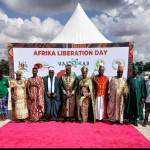A historic AIDO royal visit highlights the significance of African knowledge systems in fostering inclusive governance and promoting academic resistance.
San José, Costa Rica – In a groundbreaking display of cultural diplomacy and Pan-African unity, the University of Costa Rica (UCR) recently hosted a landmark symposium titled “The Influence of Traditional African Leadership on the Governance Models of Afro-descendant Communities.” The event served as a centerpiece of the historic AIDO Royal Visit to Costa Rica, underscoring Aido Network International’s (AIDO) global mission to amplify Afrocentric knowledge systems and drive social justice through inclusive dialogue.
Bringing together esteemed African royalty, international scholars, tribal leaders, and Afro-descendant youth, the symposium created a dynamic platform for reflection, resistance, and reinvention. AIDO’s leadership, rooted in ancestral wisdom and traditional African governance models, continues to offer meaningful solutions to the challenges faced by marginalized communities across the African diaspora.
This high-level initiative was co-organized by the Puerto Viejo Integral Development Association (ADI), the Southern Caribbean Tribal Association (ATACS)—serving as the Pro Tempore Secretariat of the Forum of Afro-Costa Rican Tribal Peoples (FPTA)—and the Afro-Costa Rica Museum (MACR), in partnership with various departments at UCR, including the Chair of African and Caribbean Studies, the School of Political Science, the Doctorate in History program, and the Office of Foreign Affairs and International Cooperation (OAICE).
“We envisioned this symposium as a platform to co-create inclusive social dialogue and to elevate historically silenced voices,” stated Ana Gabriela Murillo, Deputy Head of OAICE.
Throughout four deeply engaging panel discussions, participants examined pressing realities confronting Afro-descendant communities—systemic racism, land and territorial rights, and the absence of formal recognition for tribal identities.
Ann McKinley, from the Afro-Costa Rican Women’s Center, described systemic racism as “a structured form of social exclusion based on perceived racial caste.” She stressed the importance of ILO Convention 169, which affirms the rights of tribal peoples and the centrality of self-identification in implementing these protections.
Tribal leader Qweku Shaka Zulu added: “This is more than a conversation—it is a declaration. We are demanding the recognition of our people’s historic struggle, presence, and future.”
Author and cultural advocate Chief Dr. Quince Duncan highlighted unresolved land grievances, pointing to broken government promises of land titles to Afro-Caribbean railroad workers and continued neglect of towns such as Cahuita and Puerto Viejo. “They told us they would give us titles,” he said, “but we are still waiting. This silence may soon provoke global consequences.”
One of the most powerful panels centered on academic resistance, featuring UCR students and global voices who emphasized the necessity for Afro-descendants to move from being subjects of study to authors of knowledge.
Speakers included students Felipe Calderón Cook (Industrial Engineering), Tameka Lewis Cyrus (Political Science), and Joy Robleto (CIHATA), joined by Chief Eric Phillips, Vice President of the CARICOM Reparations Commission and senior AIDO leader, and Professor Amber Henry of Harvard University.
“Let’s stop asking if youth are ready to lead,” Phillips stated. “The real question is whether the system is prepared to follow them.”
Joy Robleto, reflecting on her experience as an Afro-descendant from Guanacaste, shared: “I didn’t know I was Black until I had to reclaim my own story. In Guanacaste, our land—and with it, our heritage—was taken. We cannot let the South Caribbean endure the same erasure.”
Tameka Lewis proposed forming an Afro-descendant Students’ Association as a platform for advocacy, cultural resilience, and structural transformation.
Princess Brandy Mukasa and Princess Filda Braun Lolem, speaking on behalf of AIDO, articulated how traditional African leadership—anchored in consensus, spirituality, and moral stewardship—remains a profound model for inclusive, ethical governance.
Their contributions reflect AIDO’s enduring commitment to advancing global understanding through policy advocacy, cultural protection, education, and leadership grounded in indigenous wisdom.
“We must uphold the cultural and territorial rights of Afro-descendant peoples not through confrontation,” said Chief Eric Phillips, “but through education, legal empowerment, and the timeless guidance of our ancestors.”
This milestone event reaffirmed AIDO’s global role in bridging Africa and its diaspora, reviving traditional governance principles to inspire contemporary justice movements. The symposium also marked a bold affirmation that Afrocentric knowledge systems are essential not only for cultural survival but for the global re-imagining of inclusive leadership.
As AIDO continues to weave connections across continents, its call to action remains rooted in dignity, history, and unity.
Bayete. Asé. Forward Together. AIDO PRESS UNIT





